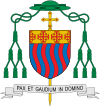English Martyrs' Catholic Church, Goring-by-Sea
| English Martyrs Catholic Church, Goring-by-Sea | |
|---|---|
 The church from the northeast | |
 | |
| 50°48′57″N 0°25′40″W / 50.8158°N 0.4277°W | |
| Denomination | Roman Catholic |
| Website | https://english-martyrs.co.uk/ |
| History | |
| Status | Parish church |
| Dedication | English Martyrs |
| Consecrated | 1970 |
| Architecture | |
| Functional status | Active |
| Architectural type | Church, utilitarian[1] |
| Completed | 1968 |
| Specifications | |
| Width | 13 metres (44 ft)[2] |
| Administration | |
| Province | Southwark |
| Diocese | Arundel & Brighton |
| Deanery | Worthing |
| Clergy | |
| Priest(s) | Fr Liam O'Connor |
| Deacon(s) | Gary Bevans |
English Martyrs' Church is in Compton Avenue, Goring-by-Sea, Worthing, West Sussex, England. It is an active Roman Catholic parish church in the diocese of Arundel & Brighton and the Worthing deanery. Hand-painted by Gary Bevans over five and a half years, English Martyrs' Church has the world's only known reproduction of Michelangelo's Sistine Chapel ceiling,[3][4] which has been described as "a marvel"[1] and "astonishing".[4]
Reproduction of Sistine Chapel ceiling
Following a visit with his wife and children to the Sistine Chapel in Rome for the beatification of the English Martyrs in 1987, sign-painter Gary Bevans was inspired to paint a copy of the Sistine Chapel frescoes on the ceiling of English Martyrs' Church.[5] The frescoes painted by Michelangelo on the ceiling of the Sistine Chapel from 1508 are regarded as one of the major artistic accomplishments of human civilisation.[6][7] Bevans realised that English Martyrs' Church is the same width as the Sistine Chapel in Rome, and slightly shorter in length.[5] Bevans had already produced works of art for the church. These included images of two of the English Martyrs - St Thomas More and St John Fisher, and a painting of the Last Supper which unusually includes Mary on Jesus' left, a young child and a Yorkshire Terrier.[8]
Having secured the backing of the parish priest he received permission from the bishop of Arundel and Brighton, Cormac Murphy-O'Connor[9] and began work later in 1987. Bevans completed the painting of the ceiling in 1993, five and a half years later. Bevans completed the works by himself, working in the evening and at weekends, in addition to his full-time job. The painted area is on a wooden vaulted surface fixed to the church roof, painted white, with frescos painted in acrylic paint.[4]
The church also has a stained glass west window, by Annie Goodman, installed in 1990, as well as Irish coloured glass in the clerestory.[1]
Adjoining barn
Next to the church lies the barn that is used as a church hall. Built in 1771 for George Jupp, a local farmer, the barn with its outbuildings was designated as a Grade II listed building on 31 January 1989.[10] In December 1937 the barn was in a derelict state when it was bought with adjoining land and turned into a chapel, with priests from St Mary of the Angels in the centre of Worthing saying mass. When the new parish was created in 1952 the barn was used as a church until it was replaced by the present church building.[11]
References
- ^ a b c Williamson et al. 2019, p. 748
- ^ "Learn how Worthing church's reproduction of Sistine Chapel ceiling came about at special exhibition". Worthing Herald. 29 July 2019. Retrieved 26 February 2020.
- ^ "Welcome to The Sistine Chapel Reproduction United Kingdom". Sistine Chapel UK. Retrieved 25 February 2020.
- ^ a b c Jones, Jonathan (14 January 2020). "The Sistine Chapel in Sussex – painted by the Michelangelo of Goring-by-Sea". The Guardian. Retrieved 25 February 2020.
- ^ a b Rule, Sheila (27 March 1989). "Worthing Journal; Sign-Painter's Sistine Ceiling: Acrylic on Plywood". New York Times. Retrieved 3 March 2020.
- ^ Gardner 1970, p. 469
- ^ Coughlan 1966, p. 116
- ^ Schweitzer, Louise (30 August 2016). "A Look Inside Goring's Sistine Chapel". Sussex Life. Retrieved 4 March 2020.
- ^ Hughes 2017
- ^ "Jupps Barn". British Listed Buildings. Retrieved 2 March 2020.
- ^ "The Barn". English Martyrs Catholic Church. Retrieved 2 March 2020.
Bibliography
- Coughlan, Robert (1966). The World of Michelangelo. Time-Life International.
- Gardner, Helen (1970). Art through the Ages. Harcourt, Brace and World. ISBN 978-0-15-508315-8.
- Hughes, Wendy (2017). The A-Z of Curious Sussex: Strange Stories of Mysteries, Crimes and Eccentrics. The History Press. ISBN 9780750986434.
- Williamson, Elizabeth; Hudson, Tim; Musson, Jeremy; Nairn, Ian; Pevsner, Nikolaus (2019). Sussex: West. Pevsner Architectural Guides: Buildings of England. Yale University Press. ISBN 9780300225211.

